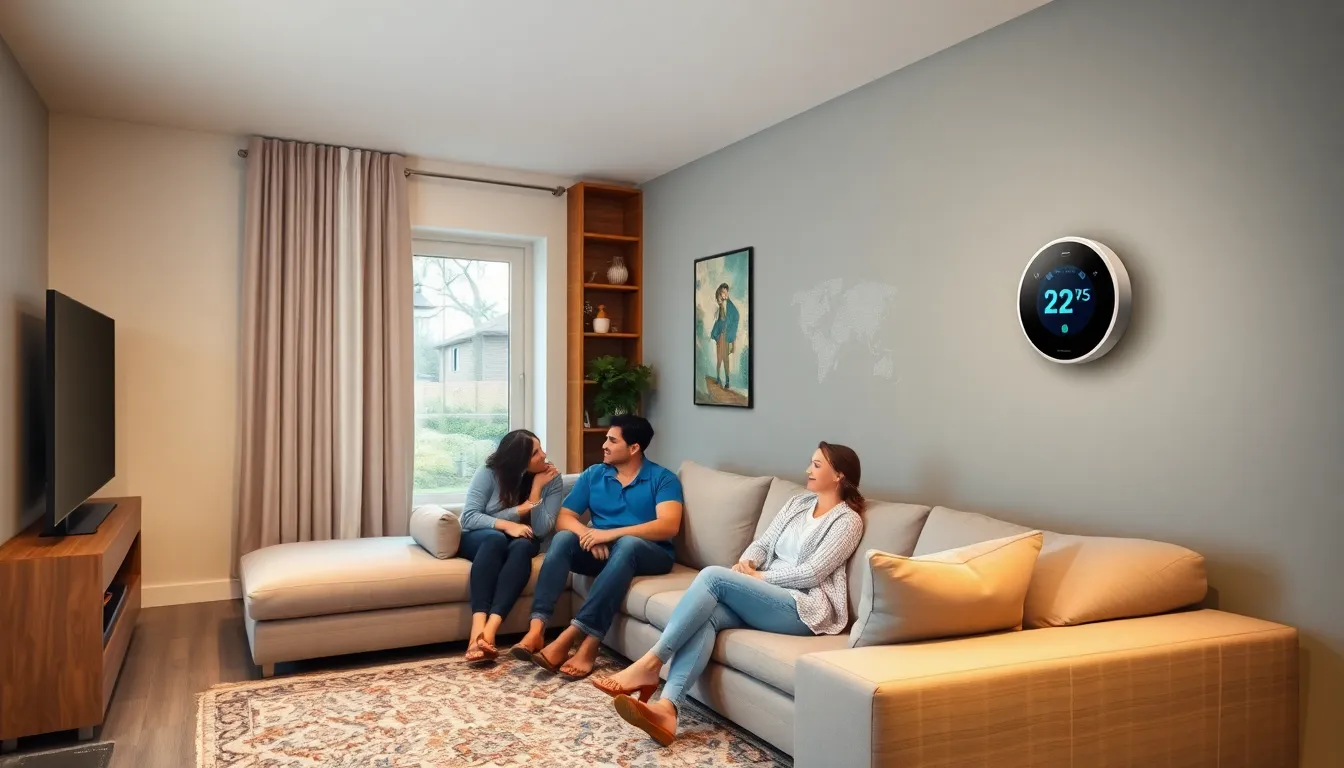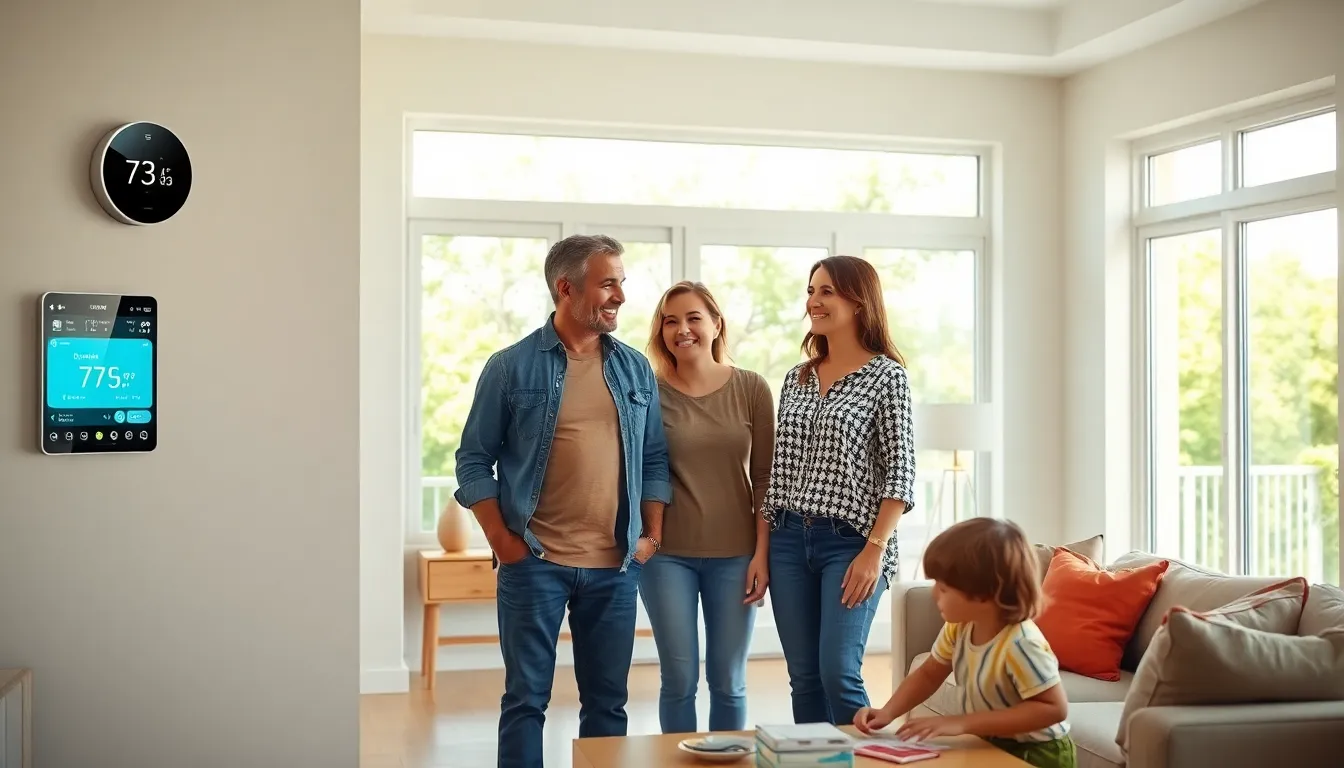Imagine walking into your home and feeling like you’ve just stepped into a perfectly curated climate oasis. No more battling with the thermostat or arguing over who gets to control the air conditioning. Climate control systems are here to save the day, ensuring your living space is as cozy as a warm hug in winter and as refreshing as a cool breeze in summer.
Table of Contents
ToggleOverview of Climate Control Home
Climate control homes utilize advanced technology to manage temperature and humidity levels effectively. These systems not only enhance comfort but also improve energy efficiency. Popular climate control solutions include smart thermostats, ductless mini-split systems, and whole-home humidifiers.
Smart thermostats provide remote access, allowing homeowners to monitor and adjust settings from anywhere. These devices often learn occupant habits, optimizing energy use based on patterns. Ductless mini-split systems offer flexible zoning options, catering to different rooms’ temperature needs without altering central heating and cooling systems.
Whole-home humidifiers play a crucial role in maintaining balanced moisture levels within indoor spaces. They prevent dry air, especially during winter months, reducing issues like dry skin and respiratory problems. Additionally, energy-efficient heating and cooling systems contribute to lower utility bills while maintaining a comfortable atmosphere.
Many homeowners are now integrating climate control into their home automation systems. By doing so, they can synchronize lighting, security, and HVAC functions for increased convenience. Enhanced air quality becomes another benefit, as modern systems often feature advanced filtration technology to reduce allergens and pollutants.
Ultimately, climate control homes provide tailored comfort solutions that adapt to individual preferences. With the layers of technology available, achieving the ideal indoor environment is straightforward and sustainable.
Importance of Climate Control

Climate control systems play a vital role in maintaining a comfortable indoor environment. They adjust temperature and humidity levels efficiently, catering to personal preferences.
Benefits of Proper Climate Control
Proper climate control enhances energy efficiency. Efficient systems reduce energy consumption, leading to lower utility bills. Comfort is improved, as homes maintain consistent temperatures, minimizing fluctuations. Home automation increases convenience, allowing remote adjustments through smart devices. Additionally, smart thermostats learn occupancy patterns, further optimizing energy use while ensuring comfort.
Impact on Health and Comfort
Health benefits arise from regulated indoor climates. Consistent humidity levels prevent mold growth and dust mites, reducing allergy triggers. Proper ventilation improves air quality, which alleviates respiratory issues. Additionally, balanced indoor temperatures can reduce fatigue and enhance productivity. Families feel more comfortable in their living spaces, which influences overall well-being positively.
Types of Climate Control Systems
Climate control systems vary in design and function, catering to diverse home environments and preferences. Understanding these systems helps homeowners choose the best options for comfort and efficiency.
HVAC Systems
HVAC stands for heating, ventilation, and air conditioning. These systems utilize centralized units to manage indoor climates effectively. Heating operates through furnaces or heat pumps and keeps spaces warm during colder months. Ventilation promotes air circulation and maintains freshness, often using ducts. Air conditioning cools indoor areas, providing relief during hot weather. Many HVAC systems feature programmable thermostats, enhancing energy efficiency. Regular maintenance ensures optimal performance, prolonging the system’s lifespan and reducing energy costs.
Smart Climate Control Solutions
Smart climate control solutions enable enhanced convenience and efficiency. These systems often integrate with home automation networks, allowing seamless control via smartphones or voice assistant devices. Smart thermostats adjust temperatures based on habits, ensuring comfortable living conditions while minimizing energy consumption. Automated window shades and smart vents complement heating and cooling systems by optimizing natural light and airflow. Energy monitoring features track usage patterns and inform homeowners of inefficiencies, promoting informed decision-making. Overall, these solutions enhance comfort and energy savings, creating personalized indoor environments.
Energy Efficiency in Climate Control
Energy efficiency plays a crucial role in climate control systems. These systems not only offer comfort but also minimize energy consumption, leading to reduced environmental impact.
Eco-Friendly Options
Eco-friendly options significantly enhance energy efficiency within climate control homes. Geothermal heating and cooling systems harness the Earth’s constant temperature, lowering energy use by up to 50%. Solar-powered systems utilize renewable energy, converting sunlight into electricity to power HVAC units. Insulation materials made from recycled content improve energy conservation by preventing heat loss. Advanced energy-efficient appliances, such as ENERGY STAR certified units, optimize performance while reducing electricity consumption. Homeowners often find that choosing eco-friendly options leads to a more sustainable lifestyle.
Cost Savings and Incentives
Cost savings through energy-efficient climate control systems can be substantial. Homeowners often experience reduced utility bills due to lower energy consumption. Many states offer incentives, such as tax credits or rebates, for installing energy-efficient systems, making the initial investment more manageable. Depending on the system, these incentives can cover up to 30% of installation costs. Long-term savings also accrue from less frequent maintenance and longer lifespan of advanced systems. Investing in energy efficiency not only improves comfort but also adds value to the home.
Choosing the Right Climate Control System
Selecting an appropriate climate control system requires careful consideration of various factors. Each system offers unique benefits tailored to specific needs.
Factors to Consider
Energy efficiency stands out as a primary consideration. Systems rated with high energy efficiency provide long-term savings on utility bills. Size significantly impacts climate control effectiveness; oversized systems can lead to inefficiencies, while undersized units struggle to maintain comfort. Home layout also matters; options like ductless mini-split systems work well for multi-zone environments. Humidity control capability is another important aspect, as maintaining balanced moisture enhances overall comfort and air quality. Lastly, compatibility with smart technology allows for greater convenience; integrating with home automation systems can greatly improve user experience.
Installation and Maintenance Tips
Professional installation often guarantees optimal performance and longevity. Technicians ensure appropriate sizing and placement of the units. Regular maintenance plays a crucial role in system efficiency; changing filters every 1 to 3 months prevents airflow obstruction and improves air quality. Seasonal check-ups help identify any potential issues before they become costly repairs. Homeowners should also clean outdoor units to maximize efficiency and prolong lifespan. Programming smart thermostats according to personal schedules can lead to significant energy savings.
Adopting a climate control system transforms any home into a haven of comfort and efficiency. With advanced technology and smart solutions available homeowners can enjoy personalized environments that cater to their specific needs. These systems not only enhance comfort but also contribute to energy savings and improved air quality.
Investing in a climate control home is more than just a luxury; it’s a step towards a healthier lifestyle. By maintaining optimal temperature and humidity levels homeowners can reduce allergens and create a welcoming atmosphere. Regular maintenance and smart integrations further ensure that these systems operate at peak performance.
Ultimately a well-designed climate control system offers a balanced blend of comfort convenience and sustainability that positively impacts daily living.







